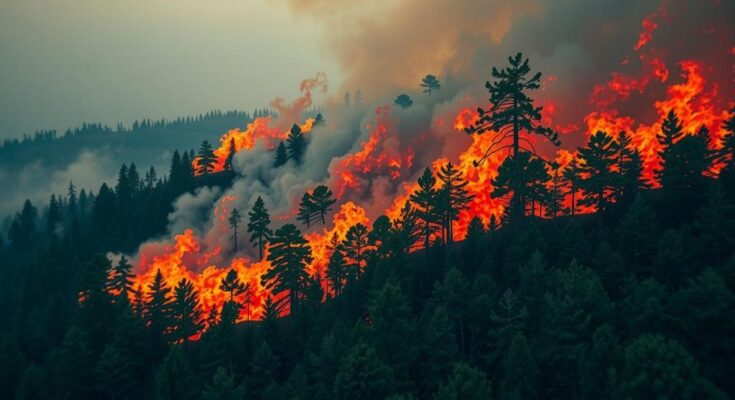Recent research demonstrates that climate change has led to an increase in forest fires, significantly worsening public health issues related to air pollution. From 2003 to 2019, areas burned increased by nearly 16% due to climate-related factors, despite a total decline in burned areas due to land repurposing. Consequently, air pollution-related deaths rose dramatically, highlighting an urgent public health crisis spurred by climate change.
Climate change significantly exacerbates forest fires, adversely affecting both environmental stability and public health due to increased air pollution associated with these fires. According to a recent study published in the scientific journal “Nature Climate Change,” which involved researchers from the federal technology institute ETH Zurich, there has been a marked increase in burned forest areas over the past few decades, necessarily linked to climate change. From 2003 to 2019, the study indicated a nearly 16% rise in forest area burned compared to scenarios without climate change, with regions such as Australia, South America, western North America, and Siberia being particularly affected. Despite an overall decline of 19% in burnt areas during this timeframe, due in part to more land being repurposed for agriculture, global warming has caused fires to impact larger areas where they do occur. While heat and drought alone are not direct triggers for wildfires, they enhance the vulnerability of forests and contribute to more intense fire incidents. Co-author Chantelle Burton stated, “Our study shows that once fires occur, the impact of climate change becomes increasingly significant with drier and warmer weather conditions,” reflecting the critical relationship between climate dynamics and wildfire severity. Moreover, a subsequent study by a research group led by Chae Yeon Park from the Japanese National Institute of Industrial Science and Technology assessed the health impacts of such fires, particularly related to smoke and fine particulate matter that can infiltrate the human respiratory system. The research highlighted a notable rise in fire-related air pollution fatalities worldwide, increasing from approximately 46,400 deaths annually in the 1960s to about 98,750 by the 2010s. The data indicated that climate change accounted for more than 12,500 of these deaths per year in the 2010s, a significant increase from only 670 in the 1960s, pinpointing regions like South America, Australia, and Europe as areas of heightened impact. Park emphasized, “Our research makes it clear that climate change increasingly poses a threat to public health, as smoke is also affecting densely populated areas more frequently.” While this analysis identifies a clear connection between climate change, forest fires, and increased health risks, it is essential to note that some areas, such as South Asia, experienced a reduction in fire-related fatalities due to increased humidity, showcasing a non-uniform effect of climate change across different regions. The methodology employed by researchers in this epidemiological study focused on the statistical relationships between health effects and exposure to pollutants, specifically considering the associations rather than definitive causal links. Thus, understanding the complex interplay between climate change, wildfires, and human health is vital for developing effective policies aimed at mitigating these risks in the future.
The publication sheds light on the dual challenge posed by climate change—escalating forest fires and the resultant impact on human health via air quality degradation. It emphasizes the need for understanding the intricate connections between climate phenomena and public health, particularly in the context of increasing wildfires driven by climate change.
The studies underscore the severe repercussions of climate change on both the frequency and intensity of forest fires, leading to substantial public health risks attributed to air pollution. The findings illustrate a pressing need for continued research and proactive measures to safeguard environmental and human health amidst the escalating threats posed by climate change-induced wildfires.
Original Source: www.swissinfo.ch




